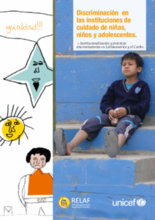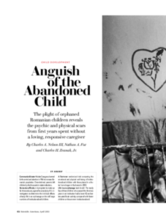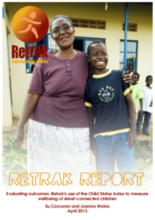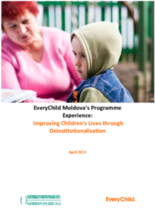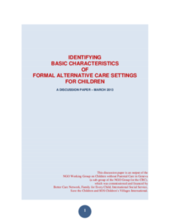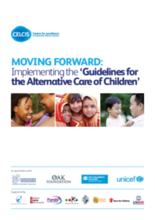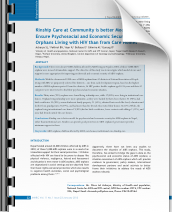Displaying 581 - 590 of 772
El presente informe refleja distintos aspectos del fenómeno de discriminación que sufren las niñas, niños y adolescentes sin cuidado parental que residen en instituciones de América Latina y el Caribe.
Published in Scientific American in 2013, this article describes the findings from the first-ever randomized trial comparing the emotional and physical well-being of institutionalized children with those placed in foster care in Bucharest, Romania.
Retrak is an organization that works with street children in Africa. This report offers an evaluation of the impact of Retrak's programs in Ethiopia and Uganda in its pilot period (2011 and 2012) and the progress of the children involved in the programs using the Child Status Index (CSI), as a measurement of child wellbeing and a tool for tracking children’s progress as they transition from the street to family homes.
This Program Review documents the evolution of EveryChild/Partnerships for Every Child’s Program in Moldova since 1994, presenting the development of interventions to improve the lives of children through deinstitutionalization and identifying the best practices and lessons that may be relevant, useful, and replicable to other initiatives and organizations around the world.
The discussion paper provides an overview of existing definitions of formal care within the UN Guidelines and a summary of the basic characteristics identified for each, together with explanations for the proposed characteristics.
This handbook, Moving Forward: Implementation of the ‘Guidelines for the Alternative Care of Children,’ is aimed at legislators, policy-makers and decision-makers, as well as professionals and care providers, to support the implementation of the Guidelines for the Alternative Care of Children, endorsed by the United Nations General Assembly in 2009. It explains the key thrusts of the Guidelines, outlines the kind of policy responses required, and describes ‘promising’ examples of efforts already made to apply them in diverse communities, countries, regions and cultures.
The objective of this study was to investigate which model of care and support is more appropriate for improving psychosocial and economic security of AIDS orphans in Nepal.
This study aims to determine the prevalence of maltreatment experienced by institutionalized children prior to their admission to Charitable Children's Institutions (orphanages) in western Kenya, and to describe their socio-demographic characteris
This article provides an outline of the early development of care and protection in Australia and New Zealand as a backdrop to an overview of child protection systems and policies and the current child protection profile in both countries. An overview of trends in relation to out of home care, including routes into care, care arrangements and permanency policies is provided.
This newsletter, translated into English, is the first of three issues produced by the “Protecting children of Moldova from family separation, violence, abuse, neglect and exploitation” project, which is implemented by Partnerships for Every Child, the Ministry of Labour, Social Protection and Family of Moldova, and the Ministry of Education of Moldova.

